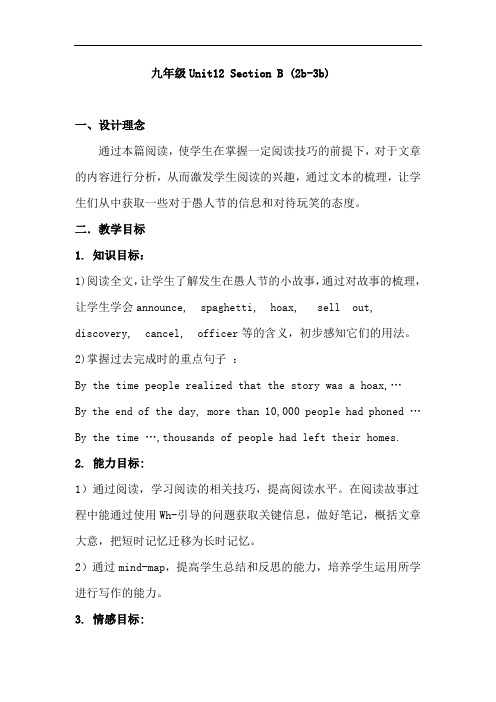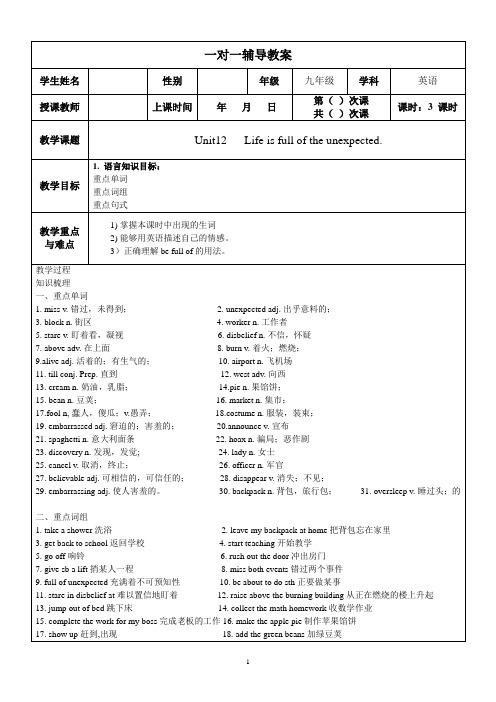九年级英语第十二单元知识点教学教材
九年级英语第十二单元知识点总结

Unit 12: Making a Difference1. Vocabulary:- Philanthropy: the desire to promote the welfare of others, expressed especially by the generous donation of money to good causes.- Volunteer: a person who freely offers to take part in an enterprise or undertake a task.- Fundraising: the process of gathering voluntary contributions of money or other resources, by requesting donations from individuals, businesses, charitable foundations, or governmental agencies.- Charity: an organization set up to provide help and raise money for those in need.- Non-profit: not established for the purpose of making a profit.- Initiative: the power or opportunity to act or take charge before others do.- Campaign: a series of planned activities designed to achieve a particular aim.2. Grammar:- Infinitives: "to" + base form of the verb, used as a noun, adjective, or adverb.- Gerunds: verb forms ending in "-ing", used as nouns.- Passive voice: the subject receives the action of the verb, rather than performing it.- Modals: auxiliary verbs that express ability, necessity, possibility, permission, or prohibition.- Connectives: words or phrases used to join words, phrases, or clauses.3. Language Functions:- Expressing opinions and beliefs.- Giving reasons and justifications.- Supporting and opposing ideas.- Taking part in discussions and debates.- Asking for and giving advice.4. Reading Skills:- Skimming: quickly going through a text to get a general idea of the main points.- Scanning: rapidly searching for specific information in a text.- Identifying the main idea and supporting details.- Understanding vocabulary in context.- Making inferences and drawing conclusions.- Analyzing the author's purpose and tone.5. Writing Skills:- Writing a persuasive essay: using logical arguments and evidence to convince the reader of a particular viewpoint.- Organizing ideas effectively with clear paragraphs and logical transitions.- Using formal language and appropriate tone.- Editing and revising for coherence, clarity, and grammatical accuracy.6. Speaking Skills:- Initiating and sustaining conversations on familiar topics.- Expressing opinions clearly and confidently.- Supporting arguments with relevant examples and evidence.- Active listening and responding appropriately to others.- Participating in group discussions and making meaningful contributions.7. Cultural Awareness:- Understanding and appreciating the importance of volunteer work in different cultures.- Recognizing the impact of philanthropy on society.- Learning about charitable organizations and their activities.。
新人教版九年级上册英语第十二单元必考知识点归纳

新人教版九年级上册英语第十二单元必考知识点归纳Unit12Lifeisfulloftheunexpected.【重点短语】taeashoer淋浴leaveybacpacathoe把背包忘在家里getbactoschool返回学校startteaching开始教学gooff响铃rushoutthedoor冲出房门givesbalift捎某人一程issbothevents错过两个事beabouttodosth正要做某事0.stareindisbeliefat难以置信地盯着1.raiseabovetheburningbuilding从正在燃烧的楼上升起jupoutofbed跳下床3.collecttheathhoeor收数学作业shoup赶到,出现【重点句型】BythetieIgotup,ybrotherhadalreadygottenintheshoer.当我起床时,我哥哥已经进了浴室了。
BythetieIgotoutside,thebushadalreadygone.当我出来时,公汽已经走了。
henIgottoschool,IrealizedIhadleftybacpacathoe.当我到达学校时,我才意识到我把背包忘在家里了。
BythetieIaledintoclass,theteacherhadstartedteaching already.当我走进教室时,老师已经开始讲课了。
BythetieIarrivedattheparty,everyoneelsehadalreadysh oedup.当我到达晚会时,其他的每个人都已经到了。
henheputthenoodlesintothebol,herealizedhehadforgott entoaddthegreenbeans.当他把面条放进碗里时,他意识到他忘了添加绿豆荚了。
Beforeshegotachancetosaygoodbye,hehadgoneintothebui lding.在她得到一个向他告别的机会之前,他已经进入楼房了。
新目标英语九年级英语第十二单元教案

Unit 12 You’re supposed to shake hands第一课时单元分析与提示教学目标语言目标:1、了解一些国家的饮食起居、生活习惯和文化异同,并用学习的知识表达自己对生活习惯的看法。
2、掌握一些与礼节、就餐等相关的词和词组。
3、加强对外国风俗和了解,扩大知识面。
认知目标1、掌握的词汇和目标语言be supposed to do; shake hands (with); drop by;should have done sth; a bit; make plans to do sth/for sthafter all; pick up; point at, point to, point out的用法;thanks for……的用法; except, besides, but的用法区别;most, mostly, the most的用法区别;be used to do sthused to do sth, be used to do sth, be/get used to sth/doing sth的用法2、学习感叹句、表语从句及非限制性定语从句情感目标本单元以谈论“习俗“为话题,了解各地不同的文化知识,从而让学生知道哪些是应该做的,哪些是不应该做的,要学会尊重不同的文化,养成良好的行为习惯,培养学生的学习兴趣。
教学重、难点感叹句常见的感叹句有两种句式:1、What a/an + adj. + n.(单数)+主语+谓语部分!What + adj. + n.(复数)+ 主语+谓语部分!What + adj. + n. (不可数)+ 主语+ 谓语部分!2、How + adj./adv. +主语+ 谓语部分!What a clever boy Tom is!What beautiful flowers they got!How quickly Lucy is running !注: How I wish to see you !我多么希望见到你啊!How they want to go there !他们多想去那儿呀!非限制性定语从句This is because they come from a computer program called ICQ, which means I seek you.句中which means I seek you属于非限制性定语从句。
初中英语_九年级英语 Unit 12 Section B (2d教学设计学情分析教材分析课后反思

九年级Unit12 Section B (2b-3b)一、设计理念通过本篇阅读,使学生在掌握一定阅读技巧的前提下,对于文章的内容进行分析,从而激发学生阅读的兴趣,通过文本的梳理,让学生们从中获取一些对于愚人节的信息和对待玩笑的态度。
二.教学目标1. 知识目标:1)阅读全文,让学生了解发生在愚人节的小故事,通过对故事的梳理,让学生学会announce, spaghetti, hoax, sell out, discovery, cancel, officer等的含义,初步感知它们的用法。
2)掌握过去完成时的重点句子:By the time people realized that the story was a hoax,…By the end of the day, more than 10,000 people had phoned …By the time …,thousands of people had left their homes. 2. 能力目标:1)通过阅读,学习阅读的相关技巧,提高阅读水平。
在阅读故事过程中能通过使用Wh-引导的问题获取关键信息,做好笔记,概括文章大意,把短时记忆迁移为长时记忆。
2)通过mind-map,提高学生总结和反思的能力,培养学生运用所学进行写作的能力。
3. 情感目标:1)了解国外愚人节风俗,帮助学生了解愚人节,对开玩笑有正确的认识和态度:开玩笑也要适当,不能伤害别人的感情,不能危害社会安全。
2)培养学生良好的合作能力和良好的行为习惯。
三.教学重点难点1. 教学重点:通过阅读,学习阅读的相关技巧,学会在阅读中构建思维导图,提高阅读水平。
2. 教学难点通过本文的梳理,提高学生的发散思维和综合运用语言知识的能力。
四.教学设计Step 1 .Leading-in & Pre-readingPlay a game: My magic boxes.(设计意图:通过游戏呈现部分生词和重点短语,为下文阅读扫清障碍,同时引出愚人节话题。
人教版英语九年级第十二单元知识点

Unite 12 Life is full of unexpected1.leave sth+地点状语:把......留在某地2.ring sb. =give sb. a ring 给某人打电话3.Stare at/into 盯着看......4.above、over与on 的区别:above/在…上方不接触,不垂直over/在…正上方不接触,垂直ron/在…上面,有接触面5.finish doing sth 完成某事6.by the time 在......以前,引导时间状语从句。
on time准时,all the time一直,始终,经常,at the time 当时7.go off 发出声响go home 回家,go shopping 去购物,go out出去,go swimming 去游泳,go to work上班,go to school去上学8.wake up 睡醒,醒来9.Put on 穿上;戴上10.end up 结束;结果为11.turn into 变成turn on打开,turn off 关掉,turn up调大,turn down调小,turn in 上交,提交,turn over翻身;翻转12.Show up 赶到;露面Show ...around带领某人参观,show sb. Sth.=show sth. to sb.给某人看某物show off炫耀;卖弄on show 展览13.get a chance to do sth 得到机会做某事have a chance of doing sth. 有做某事的可能性;by the chance碰巧;miss the chance失去机会;take the chance把握机会14.be about to do sth. 即将做某事,不可与immediately, tomorrow等表示将来的副词连用。
15.be about to ...when...就在要做......的时候,突然......(又发生另一件事)16.Invite sb. to do sth.邀请某人做某事,invite sb. to +地点邀请某人去某地17.make a fool of...取笑......;捉弄......18.announce sth. to sb.=announce to sb. sth.向某人宣告某事19.get dressed 穿衣服20.all kinds of 各种各样的be kind to sb.对某人友好,kind of 有点;稍微,a kind of一种;某种21.stop doing sth.停止做某事stop to do sth.停下来去做某事22.sell out卖光23.hundreds of数百;成百上千的24.run away 逃跑run out of 用尽,run across偶然碰到,run after追赶25.as+形容词/副词原级+as sb. can/could 某人尽可能地...=as+形容词/副词原级+as possible。
人教版九年级英语全一册第十二单元Unit12教案

A. had started learningB. have started learningC. started to learnD. started learning
【解析】by the time所引导的从句是一般过去时,其主句要用过去完成时。正确答案是A。
19. embarrassed adj.窘迫的;害羞的;20.announce v.宣布
21. spaghetti n.意大利面条22. hoax n.骗局;恶作剧
23. discovery n.发现,发觉; 24. lady n.女士
25. cancel v.取消,终止;26. officer n.军官
A. were learningB. have learntC. learnt D. had learnt
【解析】由时间状语By the end of last year可知应用过去完成时,即“had+过去分词”。正确答案是D。
3. Since 2000, Nanchang has become a new city. Everything ____.
当他把面条放进碗里时,他意识到他忘了添加绿豆荚了。
7. Before she got a chance to say goodbye, he had gone into the building.
在她得到一个向他告别的机会之前,他已经进入楼房了。
Section A(1a ~ 2d)
a.词汇包:by the time到……时候
b.句式包:
1.By the time I got outside, the bus had already left.当我出来的时候,公共汽车已经走了。
【精选】人教版九年级下册英语第十二单元《Unit 12 Life is full of the unexpected》优秀教案

Unit 12 Life is full of the unexpected.Section A (1a-2d)【学习目标】1.重点单词:unexpected,backpack,oversleep,ring2.重点短语:leave my keys in the backpack,go off,wake up,at least,give...a lift,by the time...3.重点句式:Life is full of the unexpected.By the time I got up,my brother had already gotten in the shower.Before I got to the bus stop,the bus had already left.Carl's dad saw me on the street and gave me a lift in his car.【学习重点】1.重点短语和句型2.过去完成时态【学习难点】过去完成时态【自主学习】一、预习课本P89-90新单词并背诵,完成下面的汉译英。
1.背包______________2.睡过头______________3.出于意料的______________4.(钟、铃等)鸣;响______________二、认真预习1a-2d找出下列短语和句型。
1.在……以前2.(钟表)发出声响3.睡醒4.至少5.捎(某人一程)6. 把我的钥匙丢落在背包里。
7.生活充满了出乎意料的事情。
8. 当我起床的时候我的弟弟已经进去洗澡了。
9.在我到达车站之前,公交车已经离开了。
10. 卡尔的爸爸在街上见到我,捎了我一程。
【课堂导学】Step 1情景导入Teacher:When was the telephone invented?Whom was it invented by?Student 1:The telephone was invented by Bell in 1876.Teacher:When was the TV invented?Whom was it invented by?Student 2:The TV was invented by Belld in 1927.Teacher:That is to say,when Belld invented TV in 1927,Bell had invented telephone in 1876.环节说明:本环节既复习了被动语态又引出了本节课的重点——过去完成时态。
九年级英语第十二单元教案人教版

过程与方法:1.教师首先与学生进行师生活动,引出单元教学话题,营造良好的课堂气氛。
2.学习本课时单词,进行与话题相关的听说练习,学习过去完成时的用法。
情感态度与价值观:1.提高学生在实际生活中处理意外事件的能力,培养学生面对问题时积极正面的心态。
2.通过丰富的课堂活动增进学生之间的交流和沟通,提高学生的团队协作能力。
When she ran to school, she realized she had left her backpack at home.
2)教学结对练习句型
让学生根据1a的图片造句。注意强调过去完成时的结构和用法:
had + p.p.
3)教学操练1a, 1c, 2c
让学生根据1a,2a图片内容讲述一个完整的故事,引出get outside, get to school, by the time, start doing, be late for,并用刚刚学到的目标句型来操练。抽查几对学生,让他们在全班面前,按要求进行描述。
By the time I got home, _____________.
By the time I came in, ______________.
By the time I got to school, __________.
By the time the bell rang, ___________.
3.教学难点能够在实践中灵活的运用本单元的单词、短语和句型。
教学过程
一、情境导入(Warming up)
1.教师向学生分享发生在自己身上的意外事件的故事,比如某天专程去很远的某家餐厅吃饭,到了才发现自己忘记带钱包,或者某天出门忘记带钥匙等等。在讲故事的过程中,注意激发学生的兴趣,使学生将注意力放到课堂中来。
- 1、下载文档前请自行甄别文档内容的完整性,平台不提供额外的编辑、内容补充、找答案等附加服务。
- 2、"仅部分预览"的文档,不可在线预览部分如存在完整性等问题,可反馈申请退款(可完整预览的文档不适用该条件!)。
- 3、如文档侵犯您的权益,请联系客服反馈,我们会尽快为您处理(人工客服工作时间:9:00-18:30)。
九年级英语第十二单元知识点和练习一. 重要词汇1. for the first time 第一次for the last time 最后一次She visited the Great Wall for the first time last week .He took the plane for the first time, of course he was a little nervous .I’m telling you for the last time --- don’t be late again .与time有关的词组:all the time ==always总是, 一直at the same time 同时at times 有时==sometimes by the time …到……的时候time after time \ time and time again 一次又一次; 屡次, 反复once upon a time 从前kill time 消磨时间in no time 立刻,马上==at once have a good time 过得愉快, 玩得开心from time to time 有时, 时常2. shake hands 握手shake hands with sb. 和某人握手shake sb. by the hand == shake one’s hand 握住某人的手3. arrive ( at\ in) 到达I arrived in Beijing yesterday evening .get ( to ) 到达I got to Beijing yesterday evening .reach到达I reached Beijing yesterday evening .当宾语是副词时,要省略上面短语中的at\ in和to,如arrive home\ here \ thereget home\ here \ there4. suppose (1) 动词, “认定, 猜想”后接that引导的宾语从句, that可以省略.I suppose ( that ) we’ll go there next week .I suppose ( that ) he is still in town .(2) 动词, “假设, 假如”Suppose he be here on time , what shall we do ?(3 ) be supposed to do sth.=== should 应该做某事其否定结构为be not supposed to do sth 不应该做某事Everyone is supposed to wear a seat-belt (安全带) in the car .Teachers are supposed to treat all the students alike .老师应该对所有学生一视同仁.You are not supposed to smoke on the bus .We are not supposed to play football on Sunday .It’s a secret , I’m not supposed to tell you.5.relax 动词, “使轻松, 使休息”Let’s relax ourselves by listening to music .relaxed 形容词, 某人“感到松懈的, 感到放松的”I felt relaxed after the competition .relaxing 形容词, 某物“令人松懈的, 令人轻松的”I like those relaxing country songs .6.drop by 顺便来访He dropped by to see what happened here yesterday .7. make plans to do sth \ plan to do sth. \ make plans for sth. 计划做某事We made plans for the next meeting yesterday .She often makes plans to improve her English .8. without 介词, “无, 没有”(1) without sth. 没有某物A man without a friend is only half a man .She went to work without breakfast this morning .Without air or water , we couldn’t live .(2) without doing sth. 没有做某事She spoke without thinking .He left without saying goodbye .(3) without短语常可转换成状语从句或并列句.Without your help I can’t work out the problem .== If you don’t help me I can’t work out the problem .He went out without saying a word .=== he went out and didn’t say a word .(4) without 短语作定语时, 可以转换为定语从句.Have you seen a man without friends ?== have you seen a man who has no friends ?9. pick up (1) 捡起,拾起It’s a good habit to pick up the little( 2 ) (车辆等) 中途搭人\ 带货The car stopped and picked me up . 10. every time , next time , last time 等表示时间的短语后跟一个从句, 用来作主句的时间状语.Every time I come , I always find he is busy playing computer games .Last time you left the house , you forgot to lock the door .11. point at 指向较近的人或物The teacher is pointing at the map on the wall .point to 指向较远的人或物He pointed to the house on the other side of the river andsaid, “That’s my home .”point out 指出(方向,要点,错误等)The teacher pointed out many mistakes in my homework .12. go out of one’s way to do sth. 特意(花心血、时间)做某事, 故意做某事He went out of his way to help me .We go out of our way to build our country .13. make sb \ oneself feel at home 使某人感觉在家里, 很随意, 无拘束Sit down and make yourself feel at home .14. first 首先强调动作的先后角度Before I go, I must first change my clothes .at first == at the beginning 起初; 含有“后来不这样了”的意思At first I didn’t like her , but now I do .first of all 首先, 第一; 指按时间顺序处于第一First of all , we must check the number .First of all , let me say how glad I am to be here .above all 首先,最重要的是== the most important of all 强调重要性We must work hard, and above all we must believe thateach of us is able to do something well .after all 毕竟---- I’m sorry. I didn’t do it well .---- Never mind . After all, it’s the first time for you to do it .15. 含有up 的词组:stand up 站起来grow up 长大send up 发射climb up 爬上get up 起床pick up 捡起put up 张贴,搭建look up 查找set up 建立eat up 吃关use up 用完cut up切开give up 放弃clean up 清理fix up修理16.begin with== start off with 以……开始The concert begin with the National Anthem (国歌)Begin with this one and do the others afterwards .We will begin with \ start off with music .end with 以……结尾In his speech, he began with a proverb and ended with a joke .17. 可以充当句子主语的结构:(1) 名词作主语: This picture is beautiful .(2) 代词作主语: I love you .(3) 形容词作主语: The old must be taken good care of .(4) 基数词作主语: Two and three is five .(5) 动名词作主语: Seeing is believing .(6) 动词不定式作主语: To study hard is our duty .(7) 并列结构作主语: Reading and writing are very important .(8) 主语从句作主语: What she did is not yet known .What she says isn’t always true .18. search 指对某处、某地进行搜查或搜索,对人时为搜身。
